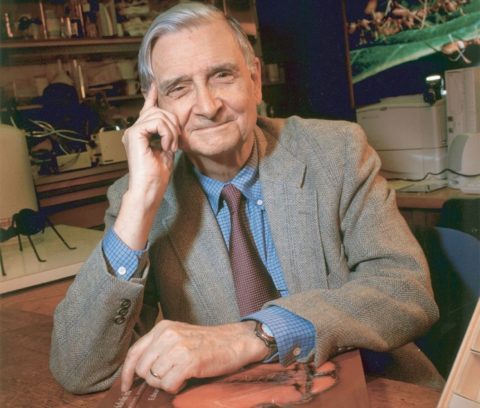In the current year, I suspect many, many scientists have been physically attacked for advocating unpopular ideas. In Quillette, Alice Dreger publishes an interview she had with Wilson in 2009:
Alice Dreger: I know you’ve spoken about it many times before, but I would like to begin by asking you about the session at the 1978 AAAS [American Association for the Advancement of Science] conference during which you were rushed on the stage and a protester emptied a pitcher of water onto your head. By all accounts, the talk you then gave was very measured. How on Earth were you able to remain so calm after being physically assaulted?
Edward O. Wilson: I think I may have been the only scientist in modern times to be physically attacked for an idea. The idea of a biological human nature was abhorrent to the demonstrators and was, in fact, too radical at the time for a lot of people — probably most social scientists and certainly many on the far-Left. They just accepted as dogma the blank-slate view of the human mind — that everything we do and think is due to contingency, rather than based upon instinct like bodily functions and the urge to keep reproducing. These people believe that everything we do is the result of historical accidents, the events of history, the development of personality through experience.
That was firmly believed in 1978 by a wide part of the population, but particularly by the political Left. And it was thought at the time that raising the specter of a biological basis for human behavior was not only wrong, but a justification for war, sexism, and racism. Biological gender differences could justify sexism, and any imputation that we evolved a human nature, or that human qualities might differ from one race to another, was dangerously racist.
So, furious ideologically based opposition had built up in 1978. That opposition had been fanned by a small number of academics including [paleontologist] Stephen Jay Gould and [evolutionary biologist] Richard Lewontin and two or three others on the Harvard faculty who thought this was a very dangerous idea and said so. These people helped organize the so-called “Science for the People” movement, or the branch of it called the “Sociobiology Study Group”. Their purpose was to discredit me personally for having brought up such a dangerous and destructive idea.
In fact, at that meeting, InCAR — the International Committee Against Racism — held up signs condemning me and sociobiology and racism in general. Of course, racism never even entered my thinking in developing these ideas. Anyway, after they dumped the water on me, amazingly, they returned to their seats while I was drying myself off. A couple of people then made short speeches — most notably Stephen Gould, of all people, the guy whose agitation and inflammatory essays had been partly responsible for all this. He addressed the demonstrators and said, in effect, that while he fully understood their motivation, violence was not the right way to achieve their goals.
As for me, I don’t know why, but I just get calm under a lot of stress. I’ve been in that sort of stressful situation many times, especially in the field. I started thinking to myself, this is probably going to be an historical moment, and it is very interesting. I wasn’t in the least doubt that my science was correct. I knew this was a kind of aberration. I understood the source because I knew the people who had been the chief thinkers, the ideological leaders. An astonishingly good percentage of them were on the faculty at Harvard. I wasn’t concerned this would come to anything in the long term.
So, someone found a paper towel and I dried my head. As soon as things settled down, I just read my talk. I knew things were going to work out — there was so much evidence accumulated already for a somewhat programmed human brain. By then, it was already coming from many directions, including genetics and neuroscience. There was no doubt about where things would go. There may be hold-outs but the inevitable conclusion from neuroscience and anthropology and genetics is for this way of thinking. [American anthropologist] Nap[oleon] Chagnon was present and he was certainly a leader in thinking about human nature and how valuable it is, and what its motivations are, by studying groups like the Yanomamö.
I knew history was on my side. I was young enough that I thought I would live through a good part of it. I was annoyed! But I wasn’t under stress in an extreme way. Before going home, I went to the next session, at which an anthropologist made the mistake of stating that I believe every cultural difference has a genetic basis, so that I am a racist. Of course, I rebutted that, but that was the kind of thing being exchanged at that meeting.




